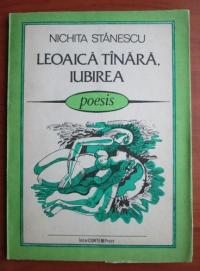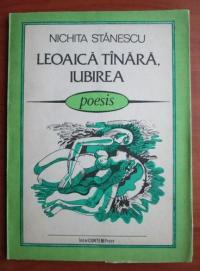Love, Young Lioness by Nichita Stanescu
original title: Leoaica Tânără, Iubirea


Nichita Stanescu is considered to be one of the innovators of poetic language in Romanian literature, along with Tudor Arghezi and Mihai Eminescu, being a representative of the generation of the '60s, and his writings are limited to neomodernist literature, literary current appeared in the second half of the century. The twentieth century that aims to create a literature in a unique way.
The poemis Love, Young Lioness included in the volume A vision of feelings, published in 1964. The volume is part of the first stage of Stanescu's creation, a stage of exuberance and youth, with the theme of love. We can distinguish four poetic sequences that follow, in turn, the changes and metamorphoses that the one who knew love goes through.
The first stanza presents the own discovery of love by the lyrical self (pronoun in the singular I being the marks of the presence of the lyrical self). Through the use of artistic means, love is materialized, the created images presenting everything as an adventure.
The second stanza can be interpreted as a cosmogonic description. The changes produced inside the lyrical self, determined by the appearance of a new feeling, love, make changes at the level of its exterior. These changes are just as sudden (and suddenly), the lyrical self now feeling the whole outside, and feelings of confusion and dizziness take over. The aggressive force of love has the power to change reality, reorganizing the world according to its own laws, in a game of circles (symbol of perfection) almost / like a pool of water.
The transformation of one's interiority is presented in the third stanza through the physical changes suffered. The one who was "affected" by love no longer recognizes himself, everything is changed, different: I put my hand on my eyebrow, on my temple and on my chin, but my hand doesn't know them anymore.
In the last stanza, time is slowed down, love now having a smooth movement (slipping into ignorance). Nothing is concrete, tangible. The state of love is similar to a mirage by the phrase: "Dessert in brilliance". The feeling that took over the lyrical self is surprising, having "cunning movements", as was his appearance.
The whole text is a broad metaphor for the manifestation of love, a feeling of energy and vibration. The central metaphor is explained in the title, through the apposition "love", this feeling being seen in the form of an aggressive prey animal, a "young lioness".
Composed of a common noun (lioness) and an adjective (young), the title is a metaphor that suggests the deep feelings of the lyrical self. The lioness is a beautiful, agile, strong cat, but she can tear you apart in a moment with her strong fangs. Love is also presented, a deep feeling with extreme feelings. the adjective young has the role of accentuating the intensity of emotions, according to the juvenile age.
In my opinion, the ambiguity of neomodernist poetry opens up several avenues of interpretation. Poetry of the encounter with love, it can be read as a meeting between the poet and the captivating inspiration of the being, which has the effect of transforming the real world into its own universe of creation, and the transformation of the simple man into a creator, which has as attributes contemplation, reflection and poetic utterance.












![Love Hina Motoko's Dilemma - Complete [Revised]](https://www.neperos.com/journal_pictures/bb5148/LupinIII_s3wdhvca84b73415.jpg)












